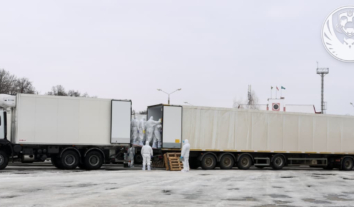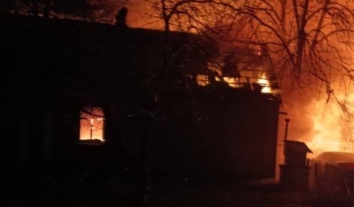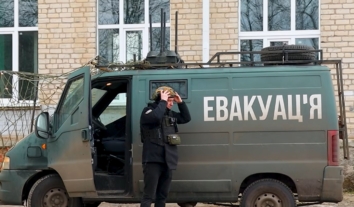From survival to strategy: study reveals recovery challenges in liberated Kharkiv and Kherson oblasts
A survey conducted by the Sociological Group Rating reveals that residents of the Kharkiv and Kherson regions face numerous challenges, including limited resources, bureaucratic obstacles, corruption, a need for investors, and extensive demining requirements. The economic situation remains fragile, particularly in rural areas where many businesses have ceased operations. While infrastructure reconstruction is ongoing, remote areas struggle to access services due to poor logistics.
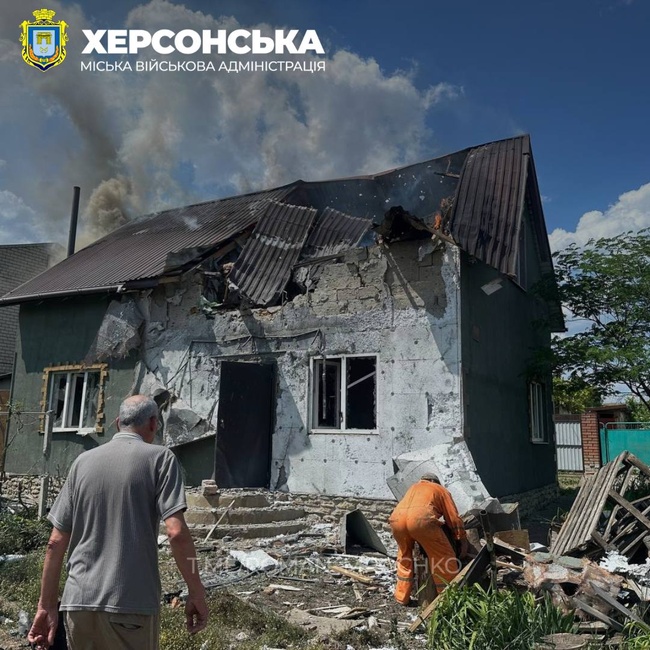 Komyshany village in Kherson region, May 24, 2024. Photo: Kherson City Military Administration
Komyshany village in Kherson region, May 24, 2024. Photo: Kherson City Military AdministrationThe NGO Transatlantic Dialogue Center published these insights in a report titled Recommendations for the development of a national reintegration strategy based on the experience of the Kharkiv and Kherson regions.
The report highlights that the Kharkiv and Kherson regions share common problems and challenges, which the Ukrainian state is likely to encounter in other de-occupied territories. These include restoring state administration, reestablishing local self-government bodies, repairing destruction, and assisting affected populations.
Representatives from de-occupied communities reported that the recovery process is gradually unfolding but remains in its “initial stage.” The progress and success of recovery significantly depend on proximity to the border or front line, the scale of destruction, and the communities’ financial capacities.
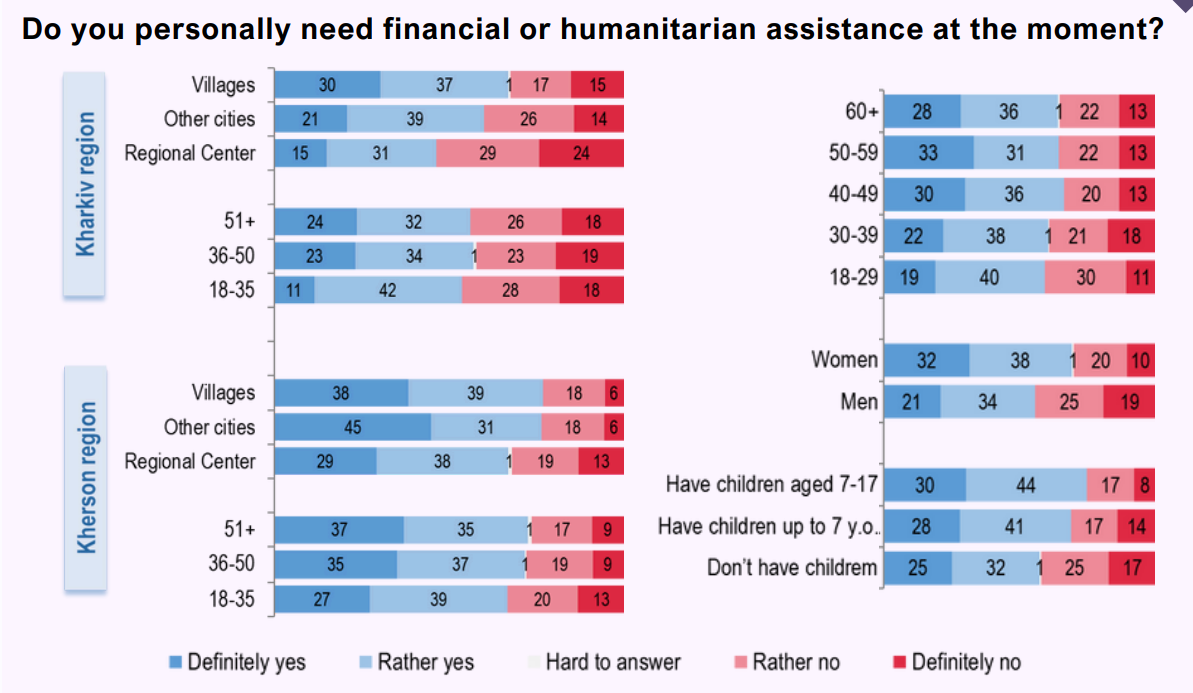
Respondents described reconstruction in liberated territories as reactive, driven by “survival” principles to meet immediate emergency needs. Experts interviewed have not yet observed long-term, systemic solutions.
Most respondents noted that specific actions have been implemented in their communities, particularly in restoring damaged housing and infrastructure. The majority are somewhat satisfied with the pace of reconstruction given the current circumstances and are generally pleased with local authorities’ involvement.
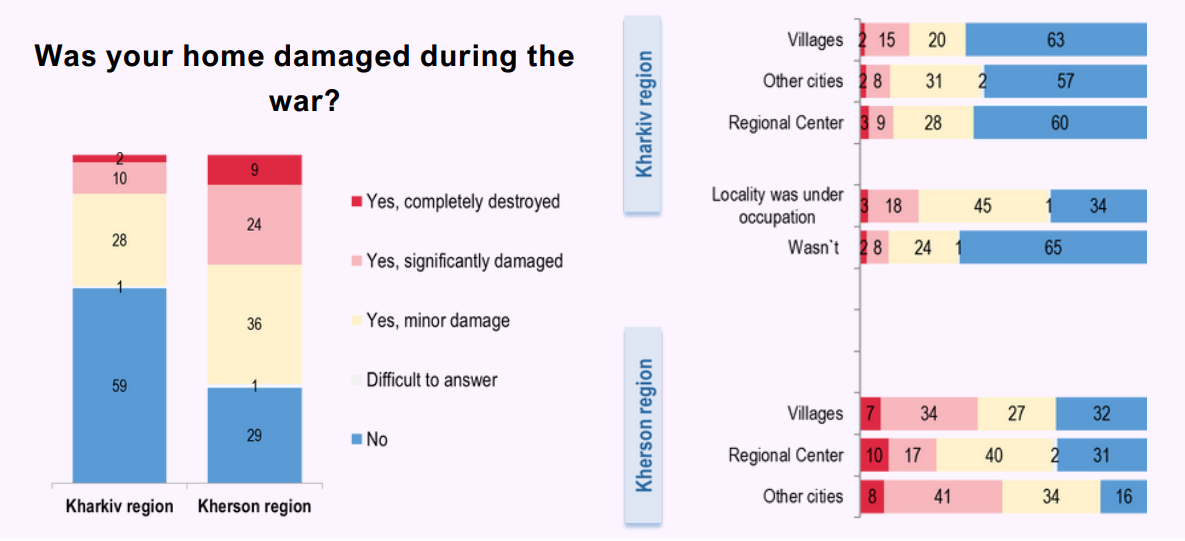
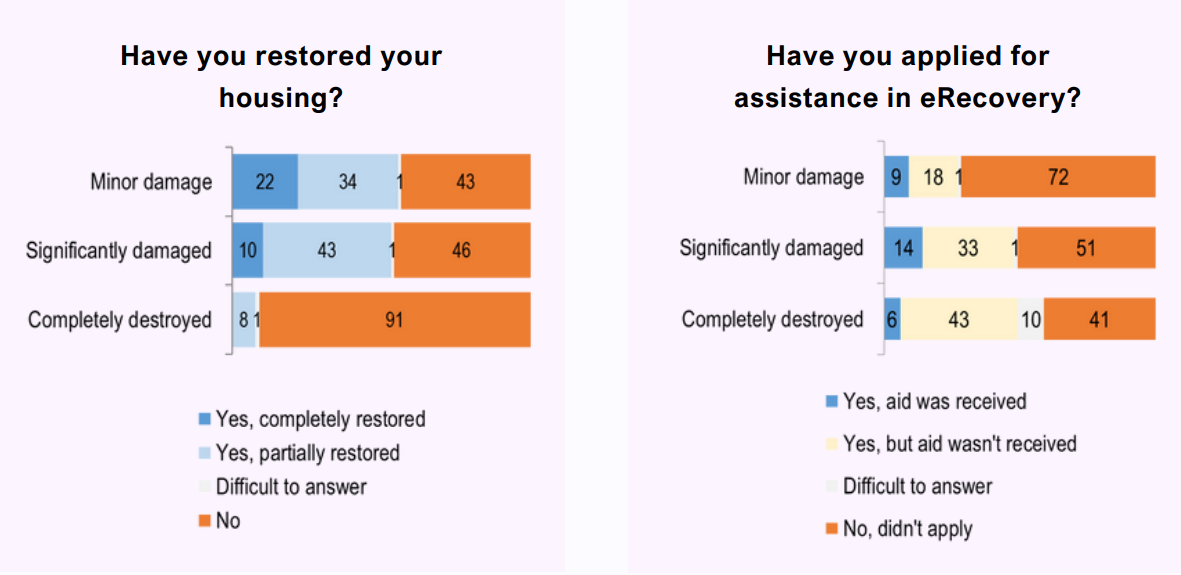
However, in larger cities, activists and civil society representatives tend to be more critical of the government. They believe reconstruction is inefficient, involves corruption, or that authorities have been slow to respond and are struggling to address ongoing challenges.
On average, on a 10-point scale, residents of the Kharkiv region communities rated the process of community reconstruction at 7 points, while residents of the Kherson region communities gave it 5.5 points. Thus, in general, respondents believe that the reconstruction of the Kharkiv region is somewhat more effective than that of the Kherson region. According to the authors of the report, the assessments also describe rebuilding the communities of both regions as relatively successful.
Both regions have common and distinct recovery needs, reflecting the varied experiences of local communities during the full-scale invasion.
Experts from the Kharkiv region primarily identified the following needs:
- Repairing roads damaged by military equipment;
- Demining;
- More rational and efficient resource allocation;
- Restoration of energy and social infrastructure;
- Provision of medical care, particularly in distant settlements.
“Medical care is a priority because in some communities, especially in distant places, it is almost 99% unavailable,” said the head of a charitable foundation, 48 years old, in Kharkiv.
For communities in Kherson region, as the authors of the report pointed out, the next step of recovery should include:
- preparing the infrastructure for the return of displaced residents;
- resumption of enterprises’ and businesses’ operations;
- restoration of social infrastructure;
- strengthening community unity, which is threatened by different experiences of the population during
the occupation and de-occupation; - addressing the issue of staff shortages and professional support for the recovery process.
“…the biggest challenge is the staff shortage. There are no good experts here. By and large, a very high percentage of people will not return here after the war, so we need to develop a plan now to bring people back or train professionals who will work here, on the ground,” an 42-years-old activist in Chornobaivka, Kherson region said.
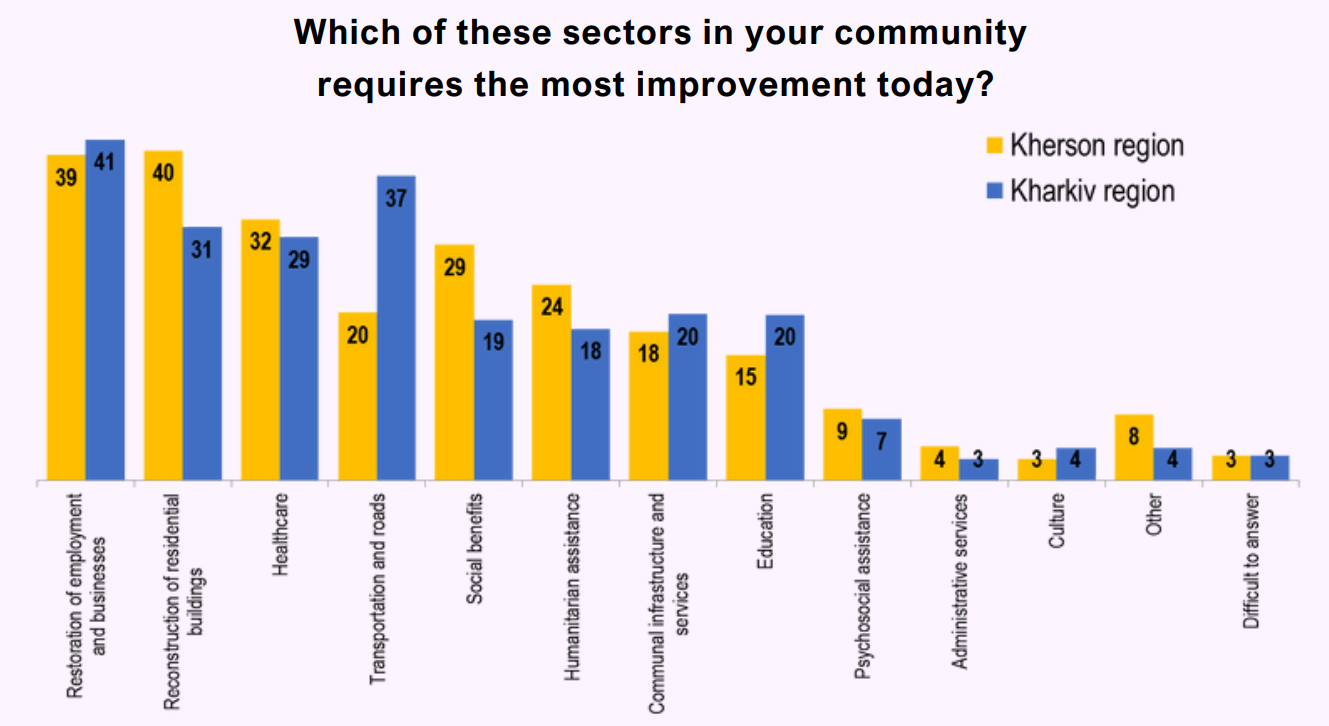
The quantitative survey revealed that both regions require the most improvement in the economy (restoring employment and businesses), reconstruction of residential buildings, transportation, roads in regional towns and villages, and healthcare.
Security remains a shared obstacle to reconstruction in both regions, with constant shelling causing new destruction and endangering lives. Due to recent shelling in the Kharkiv region, critical damage to the energy infrastructure poses a significant challenge, as it affects people’s survival in the area.
Residents of the Kharkiv region report serious difficulties due to intense Russian shelling of critical infrastructure in April–May 2024. Frontline settlements in the Kherson region also face problems with power, gas, and water supply. In some communities, such as Bilozerka in the Kherson region, unsafe drinking water poses additional challenges for the local population.
Some communities consider mobile boiler houses and local energy systems for individual districts and neighborhoods as an alternative solution. Residents have expressed a need for energy stations independent of the general system. To ensure water supply during interruptions, some communities provide generators to well owners to supply water to their neighbors.
Respondents identified children or families with children, the elderly, people with disabilities, and those with limited mobility as the main vulnerable groups in liberated communities who have suffered the most from the occupation.
In the Kherson region, respondents noted that some people do not meet current criteria for receiving assistance but need it due to difficult life circumstances, primarily caused by lack of employment and self-sufficiency opportunities.
At the same time, the lack of access to assistance is caused by restrictions imposed by donors and humanitarian organizations on specific categories of people who can receive such assistance, such as the unemployed.
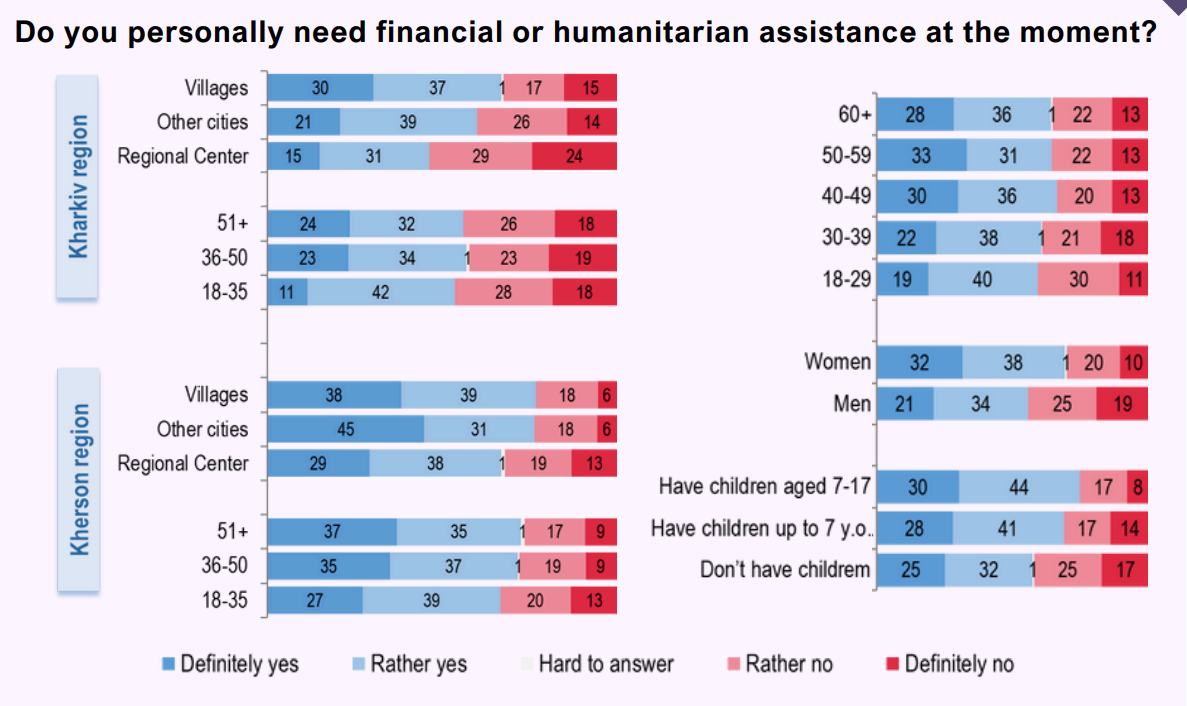
A separate issue concerns people of pre-retirement age who are not yet retired but can no longer work. They constitute a significant portion of the population needing humanitarian aid but are not officially eligible for it. According to the Transatlantic Dialogue Center, this situation creates a risk for numerous unemployed people of pre-retirement age, potentially resulting in slow economic and social recovery during reintegration.
Rebuilding trust in state institutions is essential for reintegration and reforms. Better coordination by the central government and active participation of local authorities, communities, and partners are crucial for recovery.
Pro-Ukrainian sentiment is growing, and cultural events, despite challenges, are important for socialisation and cohesion. Residents of both regions believe that media should shift to providing unbiased information and develop local media to better understand the situation on the ground.
Addressing the problem of collaborationism is important to restore a sense of justice and trust. Communities are largely united, although the issue of punishing collaborators and different experiences of war reduces the level of trust and understanding between residents of different settlements.
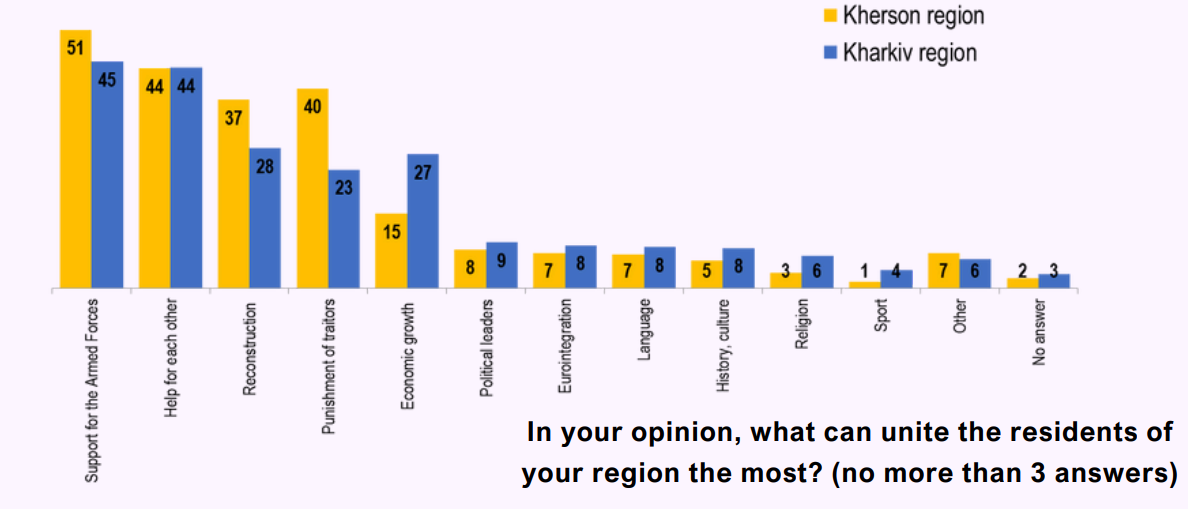
The temporary occupation has fundamentally altered the social, economic, public, and resource characteristics of territorial communities in Kharkiv and Kherson regions. The Transatlantic Dialogue Center emphasises that analysing and considering these changes is crucial for developing an effective reintegration strategy adaptable to newly liberated Ukrainian territories.
The temporary occupation has fundamentally altered the social, economic, public, and resource characteristics of territorial communities in Kharkiv and Kherson regions. Transatlantic Dialogue Center emphasizes that analyzing and considering these changes is crucial for developing an effective reintegration strategy adaptable to newly liberated Ukrainian territories.
The survey was conducted between May 2 and May 4, 2024. The quantitative component of the study was conducted using the Computer Assisted Telephone Interviewing. The study surveyed 1,200 respondents (600 in each region). The survey’s margin of error, with a confidence level of 0.95, did not exceed 4.0% at the regional level.
The sociologists interviewed active community residents, local government representatives, and civil society organizations. In total, 12 interviews were held: six per region (three for each category).
To give context, at least 9% of families in Ukraine surveyed by sociologists say they don’t have enough money even for food.
Earlier, ZMINA also reported that since the beginning of the full-scale invasion, utility debt in Ukraine has increased by 37%. From February 2022 to July 2024, the number of debts increased from 512.3 thousand to 701 thousand.








